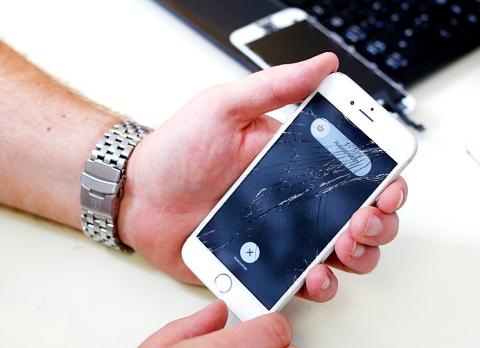Apple Inc was yesterday taken to court by Australia’s consumer watchdog for allegedly refusing to look at or repair some iPads and iPhones previously serviced by a third party.
The tech giant “made false, misleading, or deceptive representations about consumers’ rights under the Australian Consumer Law,” the Australian Competition and Consumer Commission said.
The proceedings, against Apple Pty Ltd and its US-based parent Apple Inc were brought on behalf of 275 consumers.

Photo: Reuters
Under Australian law, each breach can attract a fine of up to A$1.1 million (US$830 million), although it is up to the court to determine the size of the penalty.
The case followed an investigation by the commission into reports users who had an error that disabled their iPads or iPhones after updating their operating systems were “routinely refused” by Apple to have their devices looked at or serviced.
These customers previously had their devices serviced by a third-party, “even where that repair was unrelated to the fault,” the government body said.
“Consumer guarantee rights under the Australian Consumer Law exist independently of any manufacturer’s warranty and are not extinguished simply because a consumer has goods repaired by a third party,” Australian Competition and Consumer Commission Chairman Rod Sims said in a statement.
“Denying a consumer their consumer guarantee rights simply because they had chosen a third-party repairer not only impacts those consumers,” Sims said.
“[It] can dissuade other customers from making informed choices about their repair options, including where they may be offered at lower cost than the manufacturer,” he said.
Sims said companies must remember that consumer rights extended to software or software updates on goods they sell.
“Faults with software or software updates may entitle consumers to a free remedy under the Australian Consumer Law,” he said, adding that the commission was seeking remedies, including financial penalties.

With an approval rating of just two percent, Peruvian President Dina Boluarte might be the world’s most unpopular leader, according to pollsters. Protests greeted her rise to power 29 months ago, and have marked her entire term — joined by assorted scandals, investigations, controversies and a surge in gang violence. The 63-year-old is the target of a dozen probes, including for her alleged failure to declare gifts of luxury jewels and watches, a scandal inevitably dubbed “Rolexgate.” She is also under the microscope for a two-week undeclared absence for nose surgery — which she insists was medical, not cosmetic — and is

CAUTIOUS RECOVERY: While the manufacturing sector returned to growth amid the US-China trade truce, firms remain wary as uncertainty clouds the outlook, the CIER said The local manufacturing sector returned to expansion last month, as the official purchasing managers’ index (PMI) rose 2.1 points to 51.0, driven by a temporary easing in US-China trade tensions, the Chung-Hua Institution for Economic Research (CIER, 中華經濟研究院) said yesterday. The PMI gauges the health of the manufacturing industry, with readings above 50 indicating expansion and those below 50 signaling contraction. “Firms are not as pessimistic as they were in April, but they remain far from optimistic,” CIER president Lien Hsien-ming (連賢明) said at a news conference. The full impact of US tariff decisions is unlikely to become clear until later this month

GROWING CONCERN: Some senior Trump administration officials opposed the UAE expansion over fears that another TSMC project could jeopardize its US investment Taiwan Semiconductor Manufacturing Co (TSMC, 台積電) is evaluating building an advanced production facility in the United Arab Emirates (UAE) and has discussed the possibility with officials in US President Donald Trump’s administration, people familiar with the matter said, in a potentially major bet on the Middle East that would only come to fruition with Washington’s approval. The company has had multiple meetings in the past few months with US Special Envoy to the Middle East Steve Witkoff and officials from MGX, an influential investment vehicle overseen by the UAE president’s brother, the people said. The conversations are a continuation of talks that

CHIP DUTIES: TSMC said it voiced its concerns to Washington about tariffs, telling the US commerce department that it wants ‘fair treatment’ to protect its competitiveness Taiwan Semiconductor Manufacturing Co (TSMC, 台積電) yesterday reiterated robust business prospects for this year as strong artificial intelligence (AI) chip demand from Nvidia Corp and other customers would absorb the impacts of US tariffs. “The impact of tariffs would be indirect, as the custom tax is the importers’ responsibility, not the exporters,” TSMC chairman and chief executive officer C.C. Wei (魏哲家) said at the chipmaker’s annual shareholders’ meeting in Hsinchu City. TSMC’s business could be affected if people become reluctant to buy electronics due to inflated prices, Wei said. In addition, the chipmaker has voiced its concern to the US Department of Commerce